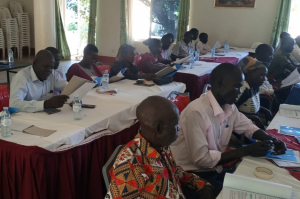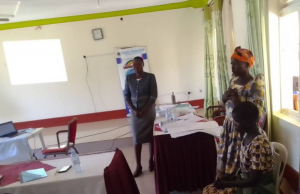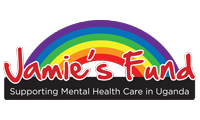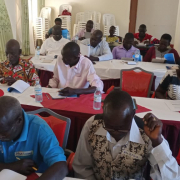Offering Community Leaders an alternative understanding of Mental Ill Health
The World Health Organisation (WHO) estimates that 1 in every 8 people in the world are living with a Mental Disorder. (This includes everything from Depression and Anxiety, through Substance Misuse and Neurodevelopmental Disorders, to Bipolar Mood and Post-Traumatic Stress Disorders, and Psychosis.)
80% of these people live in Low and Middle Income Countries. Yet despite how common it is, misunderstanding, stigma and mistreatment of people with mental ill health persists in Uganda as it does across much of the world. This can be a real barrier to effective treatment, adding to the other barriers of cost, availability and accessibility of treatment.

To address this, Jamie’s Fund embarked on an extensive programme of MH Sensitisation for community leaders who are not healthcare professionals. We developed and piloted a one day event, based on WHO guidance and materials. The aim was to raise awareness that mental ill health can be recognised as a health condition, and treated as such. It offers an alternative to the commonly held traditional beliefs involving punishment for sin, magic, disturbed ancestors and curses as causes.
We then encouraged our 25 partner Hospitals and Health Centres to send us a budgeted plan for running such events. Once agreed, we provided the necessary funding.
Recently, we have been reviewing the impact of this programme. Almost all of our partners have held at least one Community Leaders Event, and several have held two or three.

In total, at the time of writing, 1004 community leaders from across the country have participated in one of the 25 CLS events (30 days in total as some facilities ran multiple events), at an average total cost of £20 per participant.
These leaders represented a wide range of roles within local communities. For example; Youth leaders, Teachers, Civic leaders, Traditional Healers, Village Health Team volunteers, Church leaders, Community workers, Police, Bodaboda (motorbike taxi) drivers, Social workers, Business people, Carers, Prison Officers, Traditional Birth Attendants and Representatives of the elderly.
We had asked our partners to send us reports of their events. Most of these included positive comments and helpful feedback, and about half also included the scores from a Mental Health knowledge test completed by the leaders at the start and end of the event. Typical comments were:
‘‘A quite number of the leaders were surprised by some features of mental illness especially psychosis and were surprised to know that it can be treated medically without going to the witch doctors as most of them had thought it’s actually evil spirits as well as witch craft.’

And the test scores from all the facilities which returned them showed a statistically significant improvement in mental health knowledge at the end of the day’s event.
Not only that, there was evidence of changed awareness and attitudes being put into action, as previously neglected community outcasts were brought into MH clinics for treatment, and attendances soared in many places (which presented a different kind of challenge!)
Linda Shuttleworth, Jamie’s Fund Trustee

